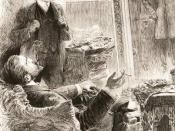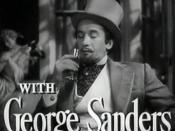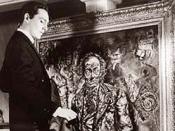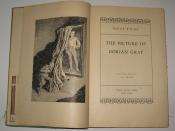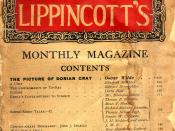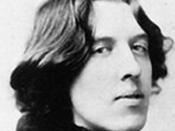# #Ashley Harris Ms. Wojcok December 10, 2001 The Picture of Dorian Gray In Oscar Wilde'sThe Picture of Dorian Gray the character Dorian changes from a good and innocent person to a cruel and cold-hearted murderer through the influence of people he meets. At the beginning of the book when he doesn't know many people he is good and everyone likes him and adores him, and is even a little bit jealous of him. By the end of the book nobody likes him anymore because of the person he becomes. His inner personality never shows on him, but he can see it in the portrait Basil painted of him.
Dorian was the kind of person everyone adored. Everyone thought he was beautiful and were fascinated by him, People were fascinated with him from first sight like Basil was. Basil described his first encounter with Dorian, "When out eyes met, I felt that I was growing pale...
I knew that I had come face to face with someone who's mere personality was so fascinating that if I allowed it to do so, it would absorb my whole nature, my whole soul, my very art itself."� (Wilde 24) Right away Lord Henry saw something in Dorian that made him want to get to know him and become and influence in his life. Lord Henry told Dorian, " The moment I met you I saw that you were quite unconscious of what you might be. There was so much in you that charmed me that I felt I must tell you something about yourself."� (Wilde 39) Basil painted the perfect picture of Dorian that showed the true wonder and beauty of Dorian, inside and out. Lord Henry thought it was the best portrait of their time ever painted saying, "It is the finest portrait of modern times."� (Wilde 41) At first the painting brought Dorian happiness. When he looked at his own portrait, " A look of joy came into his eyes."� (Wilde 41) Lord Henry's influence began a little bit after the portrait was painted. Lord Henry told Dorian how awful it was going to be for him to get older and loose his looks. Dorian then began to think about it and made a wish that he would trade places with the portrait, that he would stay forever young and handsome and the portrait would grow old and show the signs of his sins. "If only it were the other way! If it were I who was to be always young, and the picture that was to grow old! For that-for that-I would give everything! Yes, there is nothing in the whole world I would not give! I would give my soul for that!"� (Wilde 42) That was the first major turning point of Dorian's life and it came from Lord Henry.
Dorian was beginning to fall under Lord Henry's influence until he met Sibyl Vane. Once he met her he was under both her and Lord Henry's influence and tried following each person's words but didn't know whom he should really listen to. "When I close my eyes I hear [Lord Henry and Sibyl's voices], and each of them says something different. I don't know which to follow."� (Wilde 67) When he was with Sibyl he loved her and wanted to do as she thought, he regretted listening to Lord Henry. "When I am with her, I regret all that you have taught me. I become different from what you have known me to be. I am changed, and the mere touch of Sibyl Vane's hand makes me forget you and all your wrong, fascinating, poisonous, delightful theories."� (Wilde 92-93) Dorian became a good person around Sibyl. He fell in love with her and cared more about her. But Lord Henry's influence ended up winning when he told Dorian he didn't like Sibyl. So Dorian decided he didn't like her anymore and told her which caused her to kill herself. With Sibyl out of the way Lord Henry could take total control in influencing Dorian's life. Lord Henry made it a goal to take over Dorian; it was a goal he had from the beginning. Wilde described it best saying, "He would seek to dominate him-had already, indeed, half done so. He would make that wonderful spirit his own."� (Wilde 53) Dorian listened and did everything Lord Henry said. Dorian told Lord Henry this saying, ".... I am putting [one of Lord Henry's aphorisms] into practice, as I do everything you say."� (Wilde 63) Lord Henry influenced him not only through the things he said but also through a book he loaned Dorian that seemed to predict Dorian's life as he read it. Lord Henry's influence was in everything Dorian did, but it was a bad influence. Lord Henry knew this because he thought all influence was bad influence and told Dorian, "There is no such thing as good influence, Mr. Gray. All influence in immoral-immoral from the scientific point of view."� (Wilde 34) Lord Henry's influence really changed Dorian and made him begin thinking things he hadn't thought before, bad things, and taking bad actions. Once Sibyl had died and Dorian realized how cruel he had been, he noticed the painting changing and taking on the characteristics of aging and sin that would normally show on Dorian's face. After Sibyl's death was the first time he noticed the portrait changed, that in fact his wish was coming true, his portrait would change, not him. As he looked at the portrait he thought, "Surely this wish had not been fulfilled?... And yet, there was the picture before him, with the touch of cruelty in the mouth."� (Wilde 105-106) His portrait was to show his entire aging and all his sins for him. He could learn from it, or take advantage of it. He started out wanting to learn, but ended up only taking advantage of it. He showed how he wanted to use it by saying "I don't want to be at the mercy of my emotions. I want to use them, to enjoy them, and to dominate them."� (Wilde 123) Dorian's portrait taking upon his flaws allowed him to become worse and worse as a person. By the end of the book Dorian was loosing friends and people were talking badly about him. Basil tried to talk to Dorian about nobody liking him and what is going on around him. Basil asked him about why people didn't like him, " Why is it, Dorian, that a man like the Duke of Berwick leaves the room when you enter it? Why is it that so many gentlemen in London will neither go to your house or invite you to theirs?.... Why is your friendship so fatal to young men? There was the wretched boy in Guards who committed suicide.... There was Sir Henry Ashton, who had to leave England with a tarnished name.... What about Adrian Singleton and his dreadful end?......"� (Wilde 163) The awfulness of Dorian's picture began to take him over and he did more and more bad things. His picture "told"� him to do things, like get rid of Basil, "...an uncontrollable feeling of hatred for Basil Hallward came over him, as though it had been suggested to him by the image on the canvas, whispered into his ear by those grinning lips."� (Wilde 170) Dorian then killed Basil. He killed Basil in cold blood because he was the person, who painted the portrait that was tormenting him, and he was pretty much the only person who cared for him and loved him and showed it to him, and he couldn't handle that. He thought that murdering the person who painted the portrait would get rid of the misery in his life. Wilde said, "He felt that the secret of the whole thing was not to realize the situation. The friend who had painted the fatal portrait to which all his misery had been due had gone out of his life. That was enough."� (Wilde 172) Dorian blamed all his misery on Basil for painting the portrait that he didn't feel at all bad about killing him. Wilde showed this when explaining how Dorian felt, "Nor, indeed, was it the death of Basil Hallward that weighted most upon his mind.... Basil had painted the portrait that had done everything. Basil had said things to him that were unbearable, and that he had yet borne with patience."� (Wilde 233) To end his terrible way of life and to end all the madness, thinking it would just end him seeing his sins and his aging he thought he should destroy the portrait, "It would kill the past, and when it was dead, he would be free. It would kill this monstrous soul-life, and without its hideous warnings, he would be at peace."� But what he didn't know was that when he destroyed the portrait, he destroyed himself, "He seized the [knife], and stabbed the picture whit it...When they entered they found hanging upon the wall a splendid portrait of [Dorian] as they had last seen him, in all the wonder of his exquisite youth and beauty. Lying on the floor was a dead man, in evening dress, with a knife in his heart. He was withered, wrinkled, and loathsome of visage. It was not till they had examined the rings that they recognize who it was."� (Wilde 235) Dorian killed the evil portrait, which killed him because he was that evil person, and the portrait returned to its original, youthful, and innocent state.
Dorian was a character with few traits. He started out good, and everything anyone could want to be. But after being influenced by the people he met along the way and the events that followed meeting them, he began to change. He became a hated person. He also gained more and more evil, until he came to murder. He killed Basil who he thought was the cause of his misery, and his evil picture, which took his life.
